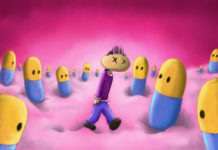What Happened When I Went Off Meds and Onto Nutrients
I remember clearly thinking, “I’m done. I’m not putting myself through this again.” I wasn’t going to settle for the side effects of a marginally better than placebo treatment again. Here is a brief look into my rollercoaster journey of recovery, returning to work, having my trauma re-triggered, finding a way through, and finally living well.
Community-Driven Healthcare for the Homeless Reduces Hospital Costs
Direct access to care in safe locations is key in reducing healthcare costs and increasing quality of life for homeless populations.
The Cochrane Collaboration Has Failed Us All
The "independent report" that investigated the complaints against Peter Gøtzsche (which included a complaint from E. Fuller Torrey) reveals that they arose in connection with his criticisms of psychiatric drugs. The Cochrane Collaboration's ouster of Gøtzsche betrays a commitment to open-minded science that is vital to serving the public good.
The Global ‘Mental Health’ Movement – Cause For Concern
On October 10th, 2018, World Mental Health Day, The Lancet Commission on Global Mental Health and Sustainable Development published a report outlining a proposal to “scale up” mental health care globally.
TCI ASIA Pacific: Engaging the Global Mental Health Movement in Dialogue
The "North driving the South" phenomenon has evoked a strong counter response from TCI Asia Pacific and allied organizations (from Africa and Latin America) — especially when we know by now that the western model of psychiatry, based on colonial practices of isolation, seclusion, and coercion, is a failure.
How Well Do Neuroleptics Work?
A recent paper published in Schizophrenia Bulletin reported on a meta-analysis of antipsychotic drugs which found that a significant number of people do not experience a remission of psychotic symptoms. The evidence base suggests that it is time for us to reappraise the effectiveness of these drugs and shift our practice patterns accordingly.
Two-Thirds of Schizophrenia Patients Do Not Remit on Antipsychotics
A new analysis of antipsychotic treatment of schizophrenia (published in Schizophrenia Bulletin) has found that two-thirds of patients treated this way do not experience symptom remission.
Systematic Review Finds Antidepressant Withdrawal Common and Potentially Long-lasting
Prominent researchers conduct a review of antidepressant withdrawal incidence, duration, and severity. Results lead to call for new clinical guidelines.
Healthy Guilt and Doing Right By Those We Have Wronged
Therapists tend to view guilt as a toxic emotion. They are often over-sensitized to the psychological effects of too much guilt—of unwarranted guilt—yet often under-sensitized to the interpersonal effects of someone having too little guilt—the absence of guilt when it is warranted. Guilt is one of the primary social emotions that keeps people socially aware.
Recovering Emotions After 24 Years on Antidepressants
My therapist and I jointly made the decision to wean me off of the drugs. In the beginning, it was a very scary process for me. Since I had twice gone off medications on my own, I knew how bad it could get. The good news is, I am alive. I feel alive, and I now have emotions, both good and bad. I am very grateful to have all of them.
Fighting the Suppression of Dissent: A Guidebook for Those Who Refuse to Conform
Political, educational, and mental health fields are joining forces in ever more powerful authoritarian rule. The DSM, proclaimed to be a scientific guidebook, is little more than a political instrument used to control undesirable behaviors and experiences. Who will fight for our rights when everybody is tranquilized into conformity?
Healthy Planet/Healthy Mind with Zach Bush, MD
Business as usual — big farming, big pharma and conventional healthcare — is threatening our planet and our very ability to survive as a species. Planetary and human health are at a tipping point. Solutions informed by the science of environmental health, epigenetics and the microbiome, are elegantly simple, but their impact is profound.
Nonclinical Factors are Associated with Long-Term Benzodiazepine Use in Older Adults
White race and size of initial prescription, along with poor sleep quality, are associated with long-term benzodiazepine use in older adults.
Helping Children With Angry Outbursts
Finnish psychiatrist Ben Furman reviews various non-drug therapies for children with aggressive outbursts of anger, including the Kids' Skills approach that he and social psychologist Tapani Ahola developed. These approaches focus on helping children come up with their own ideas for overcoming their problems with the help of family and friends.
Study Examines Voice Hearing Accounts of 499 Nonclinical Individuals
Researchers look at voice hearing experiences shared by nonclinical samples, exploring these experiences in the general population.
We Need To Talk About Self-Care
Self-care the way we’re currently practicing it is unfulfilling in the dangerous way empty carbs are: it requires more and more to sustain itself, further sinking us in isolation and the illusion of self-sufficiency. We are not going to create a society that works for everyone by approaching the task of meeting needs as a zero-sum game. We need each other, because isolation kills.
Less Than Half of Clinical Trials Comply with Legislation to Accurately Report Results
A new study finds that sponsors of clinical trials in the EU continue to fail at reporting their results as required by recent legislation.
The 57th Maudsley Debate: Interview with Professor John Read and Doctor Sue Cunliffe
This week on MIA Radio we turn our attention to Electroshock or Electroconvulsive Therapy (ECT) as it’s known in the UK. On Wednesday, September 19th, this emotive and controversial intervention was discussed at the 57th Maudsley debate, held at Kings College, London.
Reanalysis of STAR*D Study Suggests Overestimation of Antidepressant Efficacy
Reanalysis of the original primary outcome measure in the STAR*D study suggests STAR*D findings inflate improvement on antidepressant medication and exclusion criteria in conventional clinical trials results in overestimation of antidepressant efficacy.
New Video Series: ‘Parenting Today’
This series of thirty video interviews with leading experts from around the world is designed to help parents better understand how to raise strong, resilient kids and how to deal with the pressures exerted on them by the current dominant “mental disorder” paradigm. We hope that this interview series will provide helpful ideas that you may not be able to get anywhere else. The interviews can be found HERE.
Alternatives to Suicide: Strategies for Staying Alive
For more than 7,300 days of my life, waking up the next morning required me to make a conscious choice to diligently pursue something — anything — other than my impulse to die. Maybe the best teachers of how to avoid suicide will not be the people who are afraid someone else will die, but those of us who can explain how and why we regularly choose to live.
What’s Blocking Progress in Behavioral Healthcare?
It's time to stop blocking progress and give peer-run organizations the same access to the funding streams used by Community Mental Health Centers. There is no reason to give more money to the people who have had all the money all along and can't solve the problems. Open up the competition, and then see what kind of amazing developments occur.
DACA has “Immediate and Positive” Impact on Lives of Immigrant Students, Study Finds
New research demonstrates the benefits and complexities for immigrants transitioning from undocumented to DACA status.
The Science and Pseudoscience of Mental Health Podcast
A growing number of people are seeking an alternative approach to healthcare; one that focuses on achieving optimal well-being rather than symptom management, and views the health of mind, body and spirit as interconnected. The Science and Pseudoscience of Mental Health podcast will explore insights and innovations from this integrative perspective.
International Study Documents Widespread Distress in College Students
An international study of college students reveals ubiquitous social and emotional challenges faced by young adults.

































